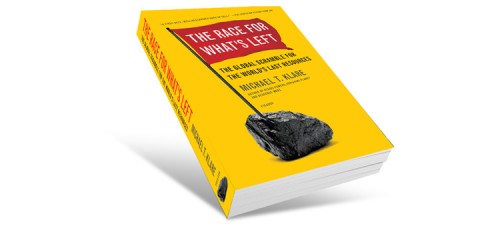
Will American “Successes” Lead to More Iraqi Military Failures?
Nick Turse
There’s good news coming out of Iraq… again. The efforts of a 65-nation coalition and punishing U.S. airstrikes have helped local ground forces roll back gains by the Islamic State (IS). Government forces and Shiite militias, for example, recaptured the city of Tikrit, while Kurdish troops ousted IS fighters from the town of Sinjar and other parts of northern Iraq. Last month, Iraqi troops finally pushed Islamic State militants out of most of the city of Ramadi, which the group had held since routing Iraqi forces there last spring. In the wake of all this, Secretary of Defense Ashton Carter touted “the kind of progress that the Iraqi forces are exhibiting in Ramadi, building on that success to… continue the campaign with the important goal of retaking Mosul as soon as possible.” Even more recently, he said those forces were “proving themselves not only motivated but capable.” I encountered the […]

Giving Advice to a Presidential Candidate Who Wants to “Do Something”
Peter Van Buren
Imagine yourself shaken awake, rushed off to a strategy meeting with your presidential candidate of choice, and told: “Come up with a plan for me to do something about ISIS!” What would you say? What Hasn’t Worked You’d need to start with a persuasive review of what hasn’t worked over the past 14-plus years. American actions against terrorism — the Islamic State being just the latest flavor — have flopped on a remarkable scale, yet remain remarkably attractive to our present crew of candidates. (Bernie Sanders might be the only exception, though he supports forming yet another coalition to defeat ISIS.) Why are the failed options still so attractive? In part, because bombing and drones are believed by the majority of Americans to be surgical procedures that kill lots of bad guys, not too many innocents, and no Americans at all. As Washington regularly imagines it, once air power is […]

The Pentagon’s Dangerous “New” Base Plan
David Vine
Amid the distractions of the holiday season, the New York Times revealed that the Obama administration is considering a Pentagon proposal to create a “new” and “enduring” system of military bases around the Middle East. Though this is being presented as a response to the rise of the Islamic State and other militant groups, there’s remarkably little that’s new about the Pentagon plan. For more than 36 years, the U.S. military has been building an unprecedented constellation of bases that stretches from Southern Europe and the Middle East to Africa and Southwest Asia. The record of these bases is disastrous. They have cost tens of billions of dollars and provided support for a long list of undemocratic host regimes, including Saudi Arabia, Bahrain, Qatar, and Djibouti. They have enabled a series of U.S. wars and military interventions, including the 2003 invasion of Iraq, which have helped make the Greater Middle […]

Political Turmoil in a Time of Low Energy Prices
Michael T. Klare
As 2015 drew to a close, many in the global energy industry were praying that the price of oil would bounce back from the abyss, restoring the petroleum-centric world of the past half-century. All evidence, however, points to a continuing depression in oil prices in 2016 — one that may, in fact, stretch into the 2020s and beyond. Given the centrality of oil (and oil revenues) in the global power equation, this is bound to translate into a profound shakeup in the political order, with petroleum-producing states from Saudi Arabia to Russia losing both prominence and geopolitical clout. To put things in perspective, it was not so long ago — in June 2014, to be exact — that Brent crude, the global benchmark for oil, was selling at $115 per barrel. Energy analysts then generally assumed that the price of oil would remain well over $100 deep into the future, […]
Putting Threats into Perspective for 2016
Tom Engelhardt
It’s time to panic! As 2015 ended, this country was certifiably terror-stricken. It had the Islamic State (IS) on the brain. Hoax terror threats or terror imbroglios shut down school systems from Los Angeles to New Hampshire, Indiana to a rural county in Virginia. The Dallas Symphony Orchestra, citing terror attacks in Paris and San Bernardino, cancelled a prospective tour of Europe thanks to terror fears, issuing a statement that “orchestra management believes there is an elevated risk to the safety of musicians and their families, guest artists, DSO personnel, and travelling patrons.” By year’s end, the Justice Department had charged an ”unprecedented” 60 people with terrorism-related crimes (often linked to social media exchanges). While just north of the border Canada’s new government and its citizens were embracing the first of 25,000 Syrian refugees in an atmosphere of near celebration, citizens and government officials in the lower 48 were squabbling and […]
Predators and the “Neutralization” of 69 People in Iraq and Syria
Nick Turse
On October 7th, at an “undisclosed location” somewhere in “Southwest Asia,” men wearing different types of camouflage and dun-colored boots gathered before a black backdrop adorned with Arabic script. They were attending a ceremony that mixed solemnity with celebration, the commemoration of a year of combat that left scores of their enemies slain. One of their leaders spoke of comraderie and honor, of forging a family and continuing a legacy. While this might sound like the description of a scene from an Islamic State (IS) video or a clip from a militia battling them, it was, in fact, a U.S. Air Force “inactivation ceremony.” There, Lieutenant Colonel Dennis Drake handed over to Colonel John Orchard the “colors” of his drone unit as it slipped into an ethereal military limbo. But that doesn’t mean the gathering had no connection to the Islamic State. It did. Within days, Drake was back […]
The Future Belongs to Renewables
Michael Klare
Historically, the transition from one energy system to another, as from wood to coal or coal to oil, has proven an enormously complicated process, requiring decades to complete. In similar fashion, it will undoubtedly be many years before renewable forms of energy — wind, solar, tidal, geothermal, and others still in development — replace fossil fuels as the world’s leading energy providers. Nonetheless, 2015 can be viewed as the year in which the epochal transition from one set of fuels to another took off, with renewables making such significant strides that, for the first time in centuries, the beginning of the end of the Fossil Fuel Era has come into sight. This shift will take place no matter how well or poorly the deal just achieved at the U.N. climate summit in Paris is carried out. Although a robust commitment by participating nations to curb future carbon emissions will certainly […]
Why the Gulf States, the Kurds, the Turks, the Sunnis, and the Shia Won’t Fight America’s War
Peter Van Buren
In the many strategies proposed to defeat the Islamic State (IS) by presidential candidates, policymakers, and media pundits alike across the American political spectrum, one common element stands out: someone else should really do it. The United States will send in planes, advisers, and special ops guys, but it would be best — and this varies depending on which pseudo-strategist you cite — if the Arabs, Kurds, Turks, Sunnis, and/or Shias would please step in soon and get America off the hook. The idea of seeing other-than-American boots on the ground, like Washington’s recently deep-sixed scheme to create some “moderate” Syrian rebels out of whole cloth, is attractive on paper. Let someone else fight America’s wars for American goals. Put an Arab face on the conflict, or if not that at least a Kurdish one (since, though they may not be Arabs, they’re close enough in an American calculus). Let […]
Turning Up the Heat on History
Tom Engelhardt
For six centuries or more, history was, above all, the story of the great game of empires. From the time the first wooden ships mounted with cannons left Europe’s shores, they began to compete for global power and control. Three, four, even five empires, rising and falling, on an increasingly commandeered and colonized planet. The story, as usually told, is a tale of concentration and of destruction until, in the wake of the second great bloodletting of the twentieth century, there were just two imperial powers left standing: the United States and the Soviet Union. Where the other empires, European and Japanese, had been, little remained but the dead, rubble, refugees, and scenes that today would be associated only with a place like Syria. The result was the ultimate imperial stand-off that we called the Cold War. The two great empires still in existence duked it out for supremacy on […]
The Folly of World War IV
Andrew Bacevich
Assume that the hawks get their way — that the United States does whatever it takes militarily to confront and destroy ISIS. Then what? Answering that question requires taking seriously the outcomes of other recent U.S. interventions in the Greater Middle East. In 1991, when the first President Bush ejected Saddam Hussein’s army from Kuwait, Americans rejoiced, believing that they had won a decisive victory. A decade later, the younger Bush seemingly outdid his father by toppling the Taliban in Afghanistan and then making short work of Saddam himself — a liberation twofer achieved in less time than it takes Americans to choose a president. After the passage of another decade, Barack Obama got into the liberation act, overthrowing the Libyan dictator Muammar Gaddafi in what appeared to be a tidy air intervention with a clean outcome. As Secretary of State Hillary Clinton memorably put it, “We came, we saw, […]
It’s the Islamic State’s Dream and Marco Rubio Agrees
Tom Engelhardt
Honestly, I don’t know whether to rant or weep, neither of which are usual impulses for me. In the wake of the slaughter in Paris, I have the urge to write one of two sentences here: Paris changed everything; Paris changes nothing. Each is, in its own way, undoubtedly true. And here’s a third sentence I know to be true: This can’t end well. Other than my hometown, New York, Paris is perhaps the city where I’ve felt most at ease. I’ve never been to Baghdad (where Paris-style Islamic State terror events are relatively commonplace); or Beirut, where they just began; or Syria’s ravaged Aleppo (thank you, Bashar al-Assad of barrel-bomb terror fame); or Mumbai (which experienced an early version of such a terror attack); or Sana’a, the capital of Yemen, now partly destroyed by the U.S.-backed Saudi air force; or Kabul, where Taliban attacks on restaurants have become the norm; or Turkey’s capital, Ankara, where Islamic State suicide bombers […]
AFRICOM’s New Math, the U.S. Base Bonanza, and “Scarier” Times Ahead in Africa
Nick Turse
In the shadows of what was once called the “dark continent,” a scramble has come and gone. If you heard nothing about it, that was by design. But look hard enough and — north to south, east to west — you’ll find the fruits of that effort: a network of bases, compounds, and other sites whose sum total exceeds the number of nations on the continent. For a military that has stumbled from Iraq to Afghanistan and suffered setbacks from Libya to Syria, it’s a rare can-do triumph. In remote locales, behind fences and beyond the gaze of prying eyes, the U.S. military has built an extensive archipelago of African outposts, transforming the continent, experts say, into a laboratory for a new kind of war. So how many U.S. military bases are there in Africa? It’s a simple question with a simple answer. For years, U.S. Africa Command (AFRICOM) gave […]
Once More Down the Rabbit Hole
Ann Jones
Ten months ago, on December 28, 2014, a ceremony in Kabul officially marked the conclusion of America’s very long war in Afghanistan. President Obama called that day “a milestone for our country.” After more than 13 years, he said, “our combat mission in Afghanistan is ending, and the longest war in American history is coming to a responsible conclusion.” That was then. This is now. In between, on September 28, 2015, came another milestone: the Taliban takeover of Kunduz, the capital of the province of the same name in northern Afghanistan, and with a population of about 270,000, the country’s fifth-largest city. A few invaders strolled unopposed to the city center to raise the white flag of the Taliban. Others went door to door, searching for Afghan women who worked for women’s organizations or the government. They looted homes, offices, and schools, stealing cars and smashing computers. They destroyed three radio stations run by […]
Averting a World of Failed States and Resource Wars
Michael Klare
At the end of November, delegations from nearly 200 countries will convene in Paris for what is billed as the most important climate meeting ever held. Officially known as the 21st Conference of the Parties (COP-21) of the United Nations Framework Convention on Climate Change (the 1992 treatythat designated that phenomenon a threat to planetary health and human survival), the Paris summit will be focused on the adoption of measures that would limit global warming to less than catastrophic levels. If it fails, world temperatures in the coming decades are likely to exceed 2 degrees Celsius (3.5 degrees Fahrenheit), the maximum amount most scientists believe the Earth can endure without experiencing irreversible climate shocks, includingsoaring temperatures and a substantial rise in global sea levels. A failure to cap carbon emissions guarantees another result as well, though one far less discussed. It will, in the long run, bring on not just climate shocks, but also worldwide instability, insurrection, and warfare. In […]
